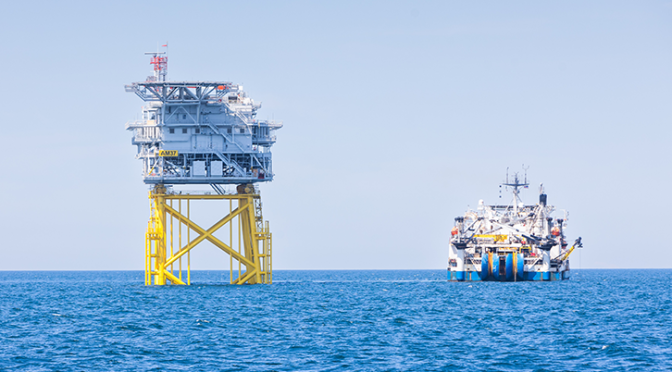Port Esbjerg and the other wind ports of the Offshore Wind Port Alliance are now calling for stronger political commitment and more support for the offshore sector. “If we are to successfully deliver on the ambitious targets for offshore wind, it’s crucial that politicians across Europe recognise and support our efforts to develop additional port capacity,” says Port Esbjerg CEO Dennis Jul Pedersen.
“The Offshore Wind Port Alliance is calling for a strong political commitment for developing ports for the offshore wind sector”.
This is the message in a new resolution from the Offshore Wind Port Alliance consisting of Europe’s largest wind ports. The six ports of the alliance are calling for strong political support for the offshore industry.
“All the port members of the alliance have an ambition to play a key role in making European offshore power plants a reality. For this to happen, it’s essential that politicians across Europe support our efforts and make changes to industrial policies in a way that will help us. We need clearly defined political goals and strategies that will support our goals,” says Dennis Jul Pedersen, CEO of Port Esbjerg.
“Otherwise, we won’t be able to deliver the necessary capacity, so this is an urgent call for action,” he says.
The EU has defined a target for 60 GW offshore wind in Europe by 2030 and for 340–450 GW by 2050. The total current capacity in the EU is about 30 GW.
The ports are calling for further measures that can provide assurance in value chains combined with substantial measures to ease the administrative burdens and make it easier to perform the necessary tasks. According to the ports, this is essential for building the capacity needed to meet the ambitious targets for the offshore sector over the next thirty years.
According to the resolution: “The ports are already supporting these goals to the greatest extent possible. We collaborate across national borders and industries to ensure that we have the right port capacity and infrastructure in place. We share best case solutions and experience on technical solutions with each other. We invest in technology, port infrastructure as well as port supra structure. However, these efforts must be supported politically by even more investments.”
Safeguarding value chains
The ports are calling for safeguarding value chains at offshore base ports to ensure a continuous flow of supplies. That would also help make the port areas more attractive as workplaces, so it will be easier to attract additional skilled labour.
Ports will do everything they can to support offshore wind targets
The ‘Offshore Wind Port Alliance’ collaboration was formed in January 2023 based on a desire to make every effort to support Europe’s ambitious offshore wind targets.
PRESS RELEASE
- oktober 2023
The six ports of the alliance are Port Oostende in Belgium, Groningen Seaports/Eemshaven in the Netherlands, Niedersachsen Ports/Cuxhaven in Germany, Nantes-Saint Nazaire Port in France, Humber in the UK and Port Esbjerg in Denmark.
According to the resolution: “The Port Alliance is ready to actively participate in the implementation of these demands and to work together with policy makers and the industry to ensure a sustainable, safe, and economically strong future for our offshore base ports. We are convinced that the implementation of these measures will not only strengthen the port industry but will also make a significant contribution to the positive development of our country’s economy.”
Securing energy independence
The six ports also want to contribute to securing the supply of energy in Europe. That will also require political support.
According to the resolution: “Diversification of energy supply and consistent implementation of sustainability goals can only succeed and be ensured through the offshore industry and offshore ports. Europe’s energy security architecture will be largely determined by European expansion targets in the offshore wind-hydrogen sector. his requires a clear language of all actors, the resulting demand is, planning security and clear and irrevocable milestones for the coming decades.”
Dennis Jul Pedersen fully agrees.
“As ports, we optimise as much as we possibly can. But it’s important that, here and now, we see and feel more political support if we are to deliver what we all want,” he says.


